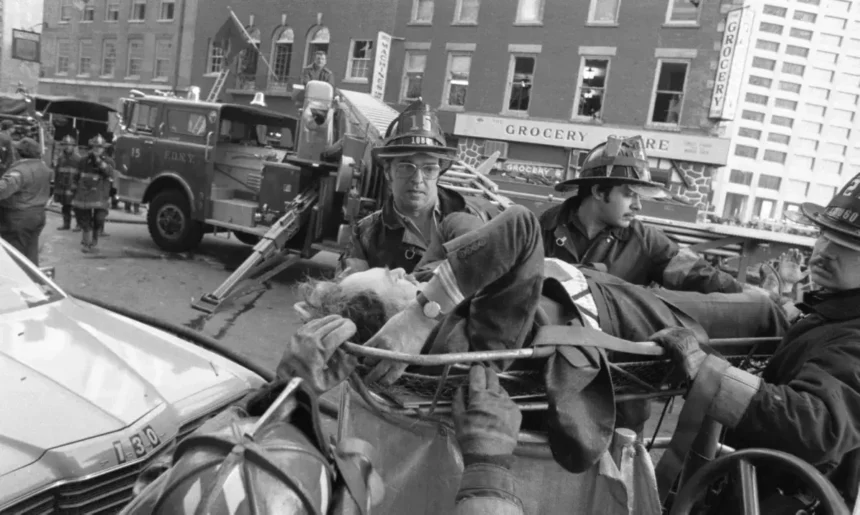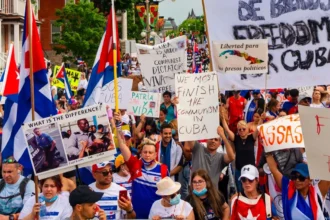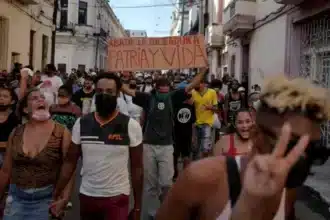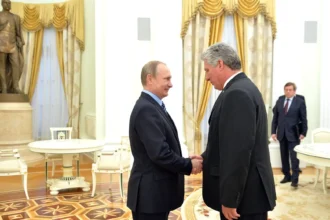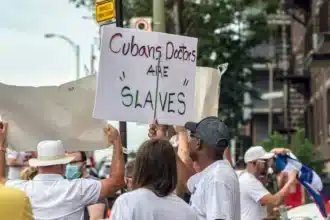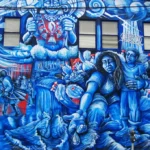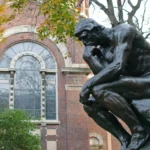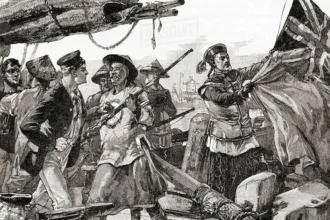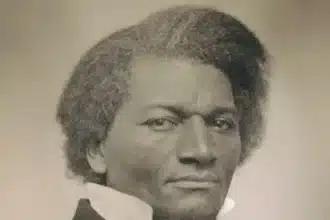The Campaign to Remove Cuba from the Terrorism Sponsor List
The Cuban dictatorship and its allies operating in communist networks in the United States have conducted a sustained campaign to remove Cuba from the list of state sponsors of terrorism, whitewashing Havana’s record and actions that have continued to the present day. It is important to correct the record and provide some context.
- The Campaign to Remove Cuba from the Terrorism Sponsor List
- Terrorism, Failed Detente, and U.S.-Cuba Relations
- Cuba’s Military Interventions and Continued Subversive Activities
- Cuba’s Ongoing Inclusion on the Terrorism Sponsors List
- Cuba’s Anti-Israel Stance and Promotion of Antisemitism
- Group with ties to Havana carries out pro-Hamas protests after terror attacks
- Cuba’s Covert Actions Against Israel and Historical Hostility
- Cuba’s Early Support for Palestinian and Global Terrorist Networks
- The Biden State Department’s reasoning for the claim that Cuba was cooperating?
In February 1969, Fidel Castro met with Swiss Ambassador Alfred Fischli and asked him to relay a message to the Nixon Administration indicating a willingness to discuss a number of contentious issues. This process led to “a bilateral anti-hijacking agreement between the United States and Cuba in January 1973.” After this “successful” agreement in 1974 the Nixon administration sent a back channel message to Fidel Castro that the United States “in principle prepared to improve relations on the basis of reciprocal measures.”
The Cuban dictatorship is a transnational threat and legitimizing it does not enhance U.S. advocacy for human rights, democratic stability in the region, or national security interests.
Castro responded favorably, leading Deputy Under Secretary of State Lawrence Eagleburger to hold a preliminary meeting on January 11, 1975, in New York City with Ramón Sánchez Parodi, a senior official of the Cuban Communist Party, and Néstor García, first secretary of Cuba’s UN mission.
Less than two weeks later, on January 24, 1975, a bomb exploded at lunchtime in the Fraunces Tavern located in Manhattan, New York City, killing four and wounded over 50. The bomb was placed by the Fuerzas Armadas de Liberación Nacional (FALN), a Puerto Rican terrorist group trained and financed by Havana. William “Guillermo” Morales, a bomb maker for the terrorist group who was later captured, escaped prison and fled the United States, and is harbored today in Cuba by the dictatorship. The group was responsible for over 130 bombings.
According to the FBI, one of the authors of this attack, Filiberto Ojeda Ríos “spent several years in Cuba in the 1960s and received training from the Government of Cuba as an intelligence officer.”
Terrorism, Failed Detente, and U.S.-Cuba Relations
This act of terrorism did not end the effort at detente. On July 29, 1975, the Ford Administration’s representative at the Organization of American States voted for an end to multilateral diplomatic and economic sanctions against Cuba.
Less than a month later, President Ford eased the US embargo.
Fidel Castro’s response was to send thousands of Cuban troops to Africa to fight in wars to advance communist objectives, and renewed calls for Puerto Rican independence, an objective of the terrorists who had carried out the attack in New York City.
Cuba’s Military Interventions and Continued Subversive Activities
The Republican administration’s attempt at detente ended as a result, but subsequent Democratic administrations tried with often worse outcomes.
The Biden State Department removed Cuba from the list of countries not cooperating in the fight against terrorism on May 15, 2024.
When Havana was implicated in using money obtained from drug trafficking to provide weapons to the Colombian M19 terrorist organization, Cuba was first listed as a state sponsor of terrorism in 1982.
During the Obama Administration, Raul Castro issued a public ultimatum, stating that US and Cuban Interests Sections could only be renamed embassies and relations normalized if Cuba was removed from the list of state sponsors of terrorism.
The Obama Administration complied in 2015, but Havana’s sponsorship of terrorism did not end.
Cuba’s Ongoing Inclusion on the Terrorism Sponsors List
Cuba was returned to the list of state sponsors of terrorism in 2021 for three main reasons provided in a statement released by Secretary of State Mike Pompeo.
“On May 13, 2020, the State Department notified Congress that it had certified Cuba under Section 40A(a) of the Arms Export Control Act as “not cooperating fully” with U.S. counterterrorism efforts in 2019. In addition to the support for international terrorism that is the basis for today’s action, the Cuban regime engages in a range of malign behavior across the region.
The Cuban intelligence and security apparatus has infiltrated Venezuela’s security and military forces, assisting Nicholas Maduro to maintain his stranglehold over his people while allowing terrorist organizations to operate. The Cuban government’s support for FARC dissidents and the ELN continues beyond Cuba’s borders as well, and the regime’s support of Maduro has created a permissive environment for international terrorists to live and thrive within Venezuela.”
This pattern of support for terrorism continued in subsequent years.
One year ago, on October 7, 2023, Iranian proxies Hamas and Islamic Jihad invaded and attacked Israel, murdering over 1,200 Israelis and other citizens (including 46 Americans), while also kidnapping 251 hostages. These Islamist terrorists deliberately targeted civilian women, including the killing, abduction and abuse of women, as well as the desecration of women’s bodies, and sexual violence. This was the largest mass murder of unarmed Jewish civilians since the Holocaust. Hezbollah, another Iran proxy, began launching rockets into northern Israel on October 8, 2023.
Cuba’s Anti-Israel Stance and Promotion of Antisemitism
On October 8, 2023, the Cuban Ministry of Foreign Relations issued a statement condemning Israel’s “impunity,” labeling the Jewish state as an occupier and the US as historically complicit. Their allies in the region took an equally anti-Israel line.
Dictators Nicolas Maduro in Venezuela, Daniel Ortega in Nicaragua, and President and former M-19 terrorist Gustavo Petro in Colombia all failed to denounce the terrorist assaults on Israel.
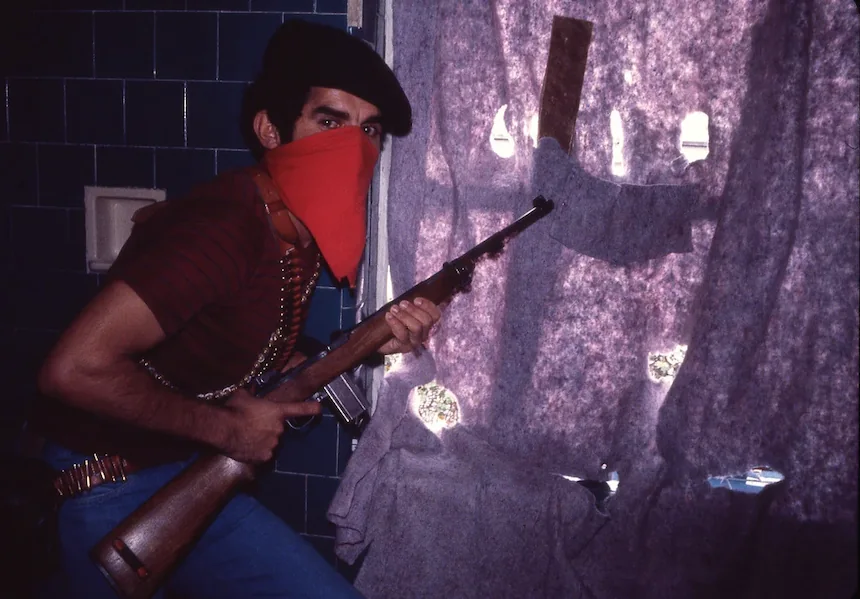
Leticia Martínez, chief of communications for Miguel Díaz-Canel, and Cuban journalist Pedro Jorge Velázquez, known as “El Necio” on X, celebrated a “Free Palestine” and justified the attacks on social media. On October 8, 2023, El Necio retweeted a post from The People’s Forum calling to dismantle the Israeli state, featuring the slogan “From the River to the Sea, Palestine Will Be Free!”
Since the October 7 Hamas terror attacks on Israel, El Necio has been repackaging antisemitic tropes from the Protocols of the Elders of Zion and disseminating blood libels against the Jewish people over X thread. The dictatorship’s official journalist described this crime against humanity as “Palestinian resistance” launching an” unprecedented offensive in Israeli territory.”
On November 23, 2023, the Cuban dictatorship organized a mandatory 100,000-person pro-Hamas march with banners and placards supporting the Hamas terrorists.
These actions were not limited to Cuba or the internet.
Group with ties to Havana carries out pro-Hamas protests after terror attacks
On October 8, 2023, one day after the terror attacks in Israel, militant leftists held a protest in Times Square to celebrate the terrorist attack as a form of resistance, yelling anti-Semitic slogans and waving banners and posters. On October 11, 2023, The People’s Forum (TPF) released a statement justifying their October 8th demonstration in Times Square and reaffirming their support for the rampage. Manolo De Los Santos, the group’s co-executive director, is a researcher at the Tricontinental: Institute for Social Research, with links to the Cuban dictatorship, and he was “based out of Cuba for many years.”
On January 24, 2024, Manolo De Los Santos said the quiet part out loud at The People’s Forum in New York City: “When we finally deal that ultimate blow to annihilate Israel. When the state of Israel is completely abolished and obliterated from history, it will be the single most powerful blow we can deliver against capitalism.“
How did the Biden Administration respond to Havana’s provocative meetings with Hamas, Iran, and their agents of influence organizing pro-Hamas protests in the United States?
The Biden State Department removed Cuba from the list of countries not cooperating in the fight against terrorism on May 15, 2024. This is the first step towards removing Cuba from the list of state sponsors of terrorism that contains sanctions that limit resources for the Cuban dictatorship to fund its illicit activities.
Joseph Connor, whose father, Frank Connor, was killed in the 1975 terrorist attack in New York City by the FALN, a Puerto Rican terrorist organization supported by Cuba, wrote to Secretary of State Antony Blinken on the same day, asking him to request the Cuban government return the terrorist involved in the bombing that killed his dad, to the United States to face justice. There has been no response to Mr. Connor’s letter.
Cuba’s Covert Actions Against Israel and Historical Hostility
On July 24, 2024 at Union Station in Washington DC a riot broke out where American flags were torn down, burned, and replaced with Palestinian flags, and police were roughed up by the mob. In the background a Cuban flag was being displayed among the Palestinian ones. This was not a coincidence. The Cuban dictatorship, and their networks in the United States continue to organize pro-Hamas protests that at times degenerate into riots.
Havana’s hostility towards Israel is not a new phenomenon.
Fidel Castro cut diplomatic ties with Israel on September 10, 1973, prior to the start of the Yom Kippur War on October 6. During the battle, 3,000 Cuban soldiers attacked Israel alongside Egyptian and Syrian forces, as well as expeditionary forces from nine other countries. Soldiers left Cuba for Syria disguised in civilian clothes and carrying false passports that identified them as university students.
They received Soviet military weapons such as T-62 tanks and SAM rocket artillery. Cuban tank personnel fought with Syrian troops against Israeli targets. Could this secretive approach also explain the presence of Cuban troops in Russian uniforms today fighting for Putin in his aggressive war against Ukraine?
Cuba’s Early Support for Palestinian and Global Terrorist Networks
Ernesto “Che” Guevara visited Gaza in 1959, and encouraged Palestinian refugees to “continue the struggle to liberate their land” “through resistance to occupation.” He asked, “where are the training camps? Where are the factories to manufacture arms? Where are people’s mobilization centers?” … “Guevara was accompanied by General Caprera, an expert in Guerilla warfare. Caprera met with community leaders to advise on methods of resistance.”
Fidel Castro applauded the formation of the Palestinian Liberation Organization (PLO) in 1965 and made contact with the Palestinian FATAH in Algiers and Damascus. Castro introduced PLO members at the Tri-Continental Conference held in Havana in January 1966. This conference brought together and supported revolutionary and terrorist groups from Europe, the Americas, and Asia.
Ilich Ramírez Sánchez, then a Venezuelan teenager, attended the Tricontinental Conference with his father. Following the terrorist gathering, Ilich reportedly spent the summer at Camp Matanzas, a guerrilla warfare school run by Cuba’s general directorate of intelligence.
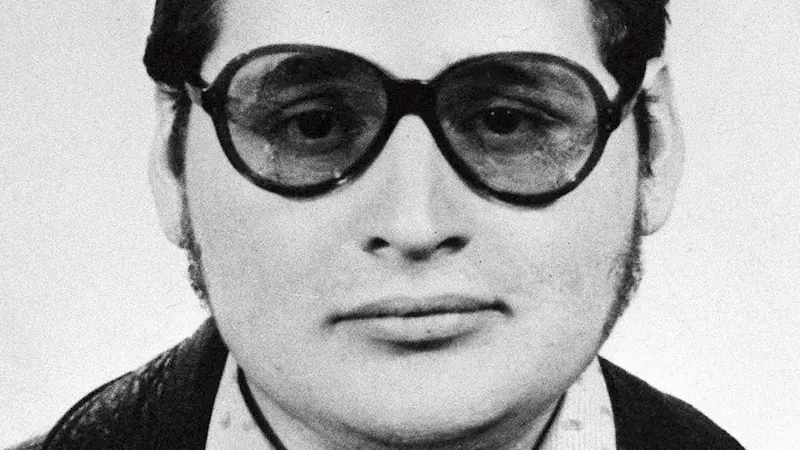
He “went to Jordan in 1970 and fought with PLO guerillas against the Jordanian Army. In the 1970s, after a string of terrorist attacks, Ilich became known as “Carlos”. On July 10, 1975, France expelled three high-ranking Cuban diplomats. ” The Cubans, according to the French Interior Ministry, were “constant visitors” to the Paris hideout of Carlos. Carlos continued committing murders for Palestinian terrorist groups until the French National Police caught him in Sudan on August 14, 1994.
After Castro severed diplomatic relations with Israel, PLO Chairman Yasser Arafat paid eight visits to Havana. In the 1970s, the Cuban Intelligence Directorate frequently sent agents to PLO camps in Lebanon, and vice versa. Between 1976 and 1982, the CIA assessed that 300 Palestinians were training at Cuban military camps.
Hezbollah was founded in southern Lebanon in 1982, and Hamas was founded in 1987, and is based in Gaza. Publicly available information shows that there have been high level meetings between Cuban diplomats and delegations of Hamas and Hezbollah over the years. Most recently in 2023. Havana since 1979 has also maintained close relations with the Islamic Republic of Iran
It is not surprising that although Havana did not condemn the murder of Israeli civilians including women, and children on October 7, 2023 by Hamas, the communist dictatorship condemned Israeli forces killing terrorist leaders of Hamas and Hezbollah in retaliation, and to prevent further attacks. Cuban president Miguel Diaz-Canel condemned over Twitter on July 31, 2024 the killing of the terrorist Hamas leader Ismail Haniyeh by the Israeli military, and extended his condolences.. Havana was also quick to condemn the killing by Israeli forces of Hassan Nasrallah, the leader of Hezbollah, on September 26, 2024.
The Biden State Department’s reasoning for the claim that Cuba was cooperating?
Although the ELN Colombian terrorists harbored by Havana, who took credit for bombing a Colombian police academy in 2019, were not extradited, the new duly elected president of Colombia, Gustavo Petro, a past member of the terrorist group M-19, with close ties to Havana, ordered his attorney general to suspend the arrest warrant “against 17 ELN commanders, including those whose extradition Colombia had previously requested from Cuba.”
Since the extradition request was ended, Cuba was no longer not cooperating, argued the Biden State Department when explaining their decision.
Given these actions, the Cuban dictatorship is a transnational threat and legitimizing it does not enhance U.S. advocacy for human rights, democratic stability in the region, or national security interests.


